ENGLISH
Verbs & Essentials of Grammar for ESL Learners
Ed Swick

Copyright 2010 by The McGraw-Hill Companies, Inc. All rights reserved. Except as permitted under the United States Copyright Act of 1976, no part of this publication may be reproduced or distributed in any form or by any means, or stored in a database or retrieval system, without the prior written permission of the publisher. ISBN: 978-0-07-170203-4 MHID: 0-07-170203-2 The material in this eBook also appears in the print version of this title: ISBN: 978-0-07-163229-4, MHID: 0-07-163229-8 All trademarks are trademarks of their respective owners. Rather than put a trademark symbol after every occurrence of a trademarked name, we use names in an editorial fashion only, and to the benefit of the trademark owner, with no intention of infringement of the trademark. Where such designations appear in this book, they have been printed with initial caps McGraw-Hill eBooks are available at special quantity discounts to use as premiums and sales promotions, or for use in corporate training programs.
To contact a representative please e-mail us at bulksales@mcgraw-hill.com. TERMS OF USE This is a copyrighted work and The McGraw-Hill Companies, Inc. (McGraw-Hill) and its licensors reserve all rights in and to the work. Use of this work is subject to these terms. Except as permitted under the Copyright Act of 1976 and the right to store and retrieve one copy of the work, you may not decompile, disassemble, reverse engineer, reproduce, modify, create derivative works based upon, transmit, distribute, disseminate, sell, publish or sublicense the work or any part of it without McGraw-Hill's prior consent. You may use the work for your own noncommercial and personal use; any other use of the work is strictly prohibited.
Your right to use the work may be terminated if you fail to comply with these terms. THE WORK IS PROVIDED AS IS. McGRAW-HILL AND ITS LICENSORS MAKE NO GUARANTEES OR WARRANTIES AS TO THE ACCURACY, ADEQUACY OR COMPLETENESS OF OR RESULTS TO BE OBTAINED FROM USING THE WORK, INCLUDING ANY INFORMATION THAT CAN BE ACCESSED THROUGH THE WORK VIA HYPERLINK OR OTHERWISE, AND EXPRESSLY DISCLAIM ANY WARRANTY, EXPRESS OR IMPLIED, INCLUDING BUT NOT LIMITED TO IMPLIED WARRANTIES OF MERCHANTABILITY OR FITNESS FOR A PARTICULAR PURPOSE. McGraw-Hill and its licensors do not warrant or guarantee that the functions contained in the work will meet your requirements or that its operation will be uninterrupted or error free. Neither McGraw-Hill nor its licensors shall be liable to you or anyone else for any inaccuracy, error or omission, regardless of cause, in the work or for any damages resulting therefrom. McGraw-Hill has no responsibility for the content of any information accessed through the work.
Under no circumstances shall McGraw-Hill and/or its licensors be liable for any indirect, incidental, special, punitive, consequential or similar damages that result from the use of or inability to use the work, even if any of them has been advised of the possibility of such damages. This limitation of liability shall apply to any claim or cause whatsoever whether such claim or cause arises in contract, tort or otherwise. This book is dedicated to my terrific grandchildren: Riane, Aaron, and Riley Swick and Jalyn and Tori Cox.
Contents
Preface
English Verbs & Essentials of Grammar for ESL Learners is a practical guide and handbook for the student of English who wants a quick reference on verbs and grammar. The purpose of the book is to present and illustrate the major concepts of the language that are the basis for speaking, understanding, reading, and writing with accuracy. illustrates the formation and function of phrasal verbs, an English concept that is often a mystery to nonnative speakers.
The language used in the examples throughout the book is authentic and contemporary. Verb usage and tenses are summarized in provides a complete list of irregular verbs and the formations they take in the past tense and as past participles. Each appendix serves as a guide to quick answers to the most commonly posed questions about verbs. uses language that is simple and concise, which makes the book practical for English students of any level of proficiency. Students of English will find this a helpful handbook for review or even as an introduction to new concepts.
Part I
English Verbs
1.Part I
English Verbs
The English present-tense conjugations are relatively simple to form. There are three distinct types of present-tense conjugations: 1. The simple present tense, which indicates a habitual or repeated action 2. The progressive, which indicates an ongoing or incomplete action 3. The emphatic response
The Simple Present Tense
The simple present tense of most verbs requires only an
-s ending in the third-person singular. This is true whether the subject is a pronoun (
he, she, it) or a singular noun.
The first- and second-person pronouns (I, we, you), the third-person plural pronoun (they), and plural nouns require no ending in the present tense of this type:  This tense shows a habitual or repeated action: I always help my friends. (always = I help my friends all of the time.) He runs the fastest. (It is his habit to run the fastest.) They put salt on the sidewalk after it snows. (This habit occurs after every snow.) When negating verbs in the simple present tense, the auxiliary to do followed by the adverb not is required. They both precede the negated verb:
This tense shows a habitual or repeated action: I always help my friends. (always = I help my friends all of the time.) He runs the fastest. (It is his habit to run the fastest.) They put salt on the sidewalk after it snows. (This habit occurs after every snow.) When negating verbs in the simple present tense, the auxiliary to do followed by the adverb not is required. They both precede the negated verb:  There are only two English verbs that have a more complex conjugation in the simple present tense:
There are only two English verbs that have a more complex conjugation in the simple present tense: 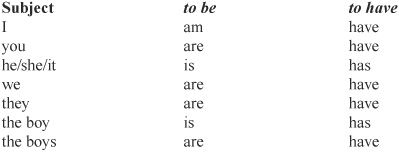 These two verbs also show a habitual or repeated action. (My regular activity is being a student.) They are seldom home. (Their occasional habit is to be away from home.) She often has toast for breakfast. (Her habit is to have toast for breakfast.) I have five brothers. (These boys are my brothers every minute of every day.) When negating to be, the adverb not follows the conjugated form of to be. (These boys are my brothers every minute of every day.) When negating to be, the adverb not follows the conjugated form of to be.
These two verbs also show a habitual or repeated action. (My regular activity is being a student.) They are seldom home. (Their occasional habit is to be away from home.) She often has toast for breakfast. (Her habit is to have toast for breakfast.) I have five brothers. (These boys are my brothers every minute of every day.) When negating to be, the adverb not follows the conjugated form of to be. (These boys are my brothers every minute of every day.) When negating to be, the adverb not follows the conjugated form of to be.
When negating to have as a transitive verb, a form of to do is required followed by the adverb not: This is not my idea of fun. I do not have your documents. We arent alone in this room. Mark doesnt have any change.
Auxiliaries
Most auxiliaries do not require an ending in the third-person singular conjugation, except those that are derived from a transitive verb or those formed with the verb
to be. The auxiliary
must 


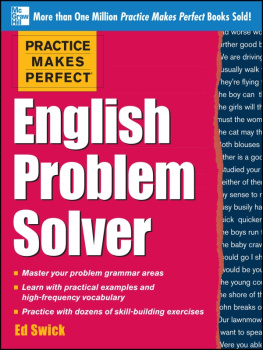
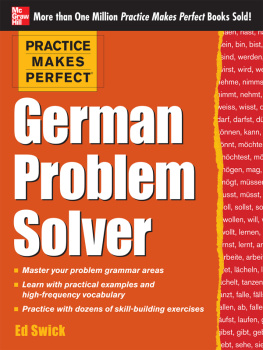

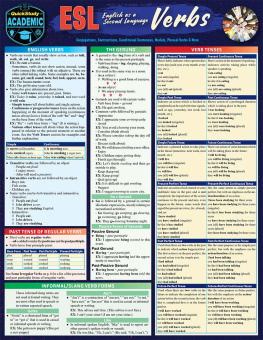
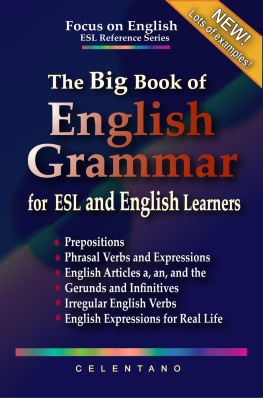
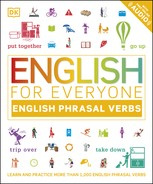
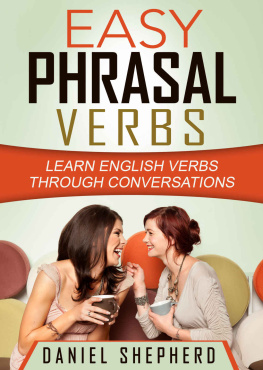

 Copyright 2010 by The McGraw-Hill Companies, Inc. All rights reserved. Except as permitted under the United States Copyright Act of 1976, no part of this publication may be reproduced or distributed in any form or by any means, or stored in a database or retrieval system, without the prior written permission of the publisher. ISBN: 978-0-07-170203-4 MHID: 0-07-170203-2 The material in this eBook also appears in the print version of this title: ISBN: 978-0-07-163229-4, MHID: 0-07-163229-8 All trademarks are trademarks of their respective owners. Rather than put a trademark symbol after every occurrence of a trademarked name, we use names in an editorial fashion only, and to the benefit of the trademark owner, with no intention of infringement of the trademark. Where such designations appear in this book, they have been printed with initial caps McGraw-Hill eBooks are available at special quantity discounts to use as premiums and sales promotions, or for use in corporate training programs.
Copyright 2010 by The McGraw-Hill Companies, Inc. All rights reserved. Except as permitted under the United States Copyright Act of 1976, no part of this publication may be reproduced or distributed in any form or by any means, or stored in a database or retrieval system, without the prior written permission of the publisher. ISBN: 978-0-07-170203-4 MHID: 0-07-170203-2 The material in this eBook also appears in the print version of this title: ISBN: 978-0-07-163229-4, MHID: 0-07-163229-8 All trademarks are trademarks of their respective owners. Rather than put a trademark symbol after every occurrence of a trademarked name, we use names in an editorial fashion only, and to the benefit of the trademark owner, with no intention of infringement of the trademark. Where such designations appear in this book, they have been printed with initial caps McGraw-Hill eBooks are available at special quantity discounts to use as premiums and sales promotions, or for use in corporate training programs.  This tense shows a habitual or repeated action: I always help my friends. (always = I help my friends all of the time.) He runs the fastest. (It is his habit to run the fastest.) They put salt on the sidewalk after it snows. (This habit occurs after every snow.) When negating verbs in the simple present tense, the auxiliary to do followed by the adverb not is required. They both precede the negated verb:
This tense shows a habitual or repeated action: I always help my friends. (always = I help my friends all of the time.) He runs the fastest. (It is his habit to run the fastest.) They put salt on the sidewalk after it snows. (This habit occurs after every snow.) When negating verbs in the simple present tense, the auxiliary to do followed by the adverb not is required. They both precede the negated verb:  There are only two English verbs that have a more complex conjugation in the simple present tense:
There are only two English verbs that have a more complex conjugation in the simple present tense:  These two verbs also show a habitual or repeated action. (My regular activity is being a student.) They are seldom home. (Their occasional habit is to be away from home.) She often has toast for breakfast. (Her habit is to have toast for breakfast.) I have five brothers. (These boys are my brothers every minute of every day.) When negating to be, the adverb not follows the conjugated form of to be. (These boys are my brothers every minute of every day.) When negating to be, the adverb not follows the conjugated form of to be.
These two verbs also show a habitual or repeated action. (My regular activity is being a student.) They are seldom home. (Their occasional habit is to be away from home.) She often has toast for breakfast. (Her habit is to have toast for breakfast.) I have five brothers. (These boys are my brothers every minute of every day.) When negating to be, the adverb not follows the conjugated form of to be. (These boys are my brothers every minute of every day.) When negating to be, the adverb not follows the conjugated form of to be.